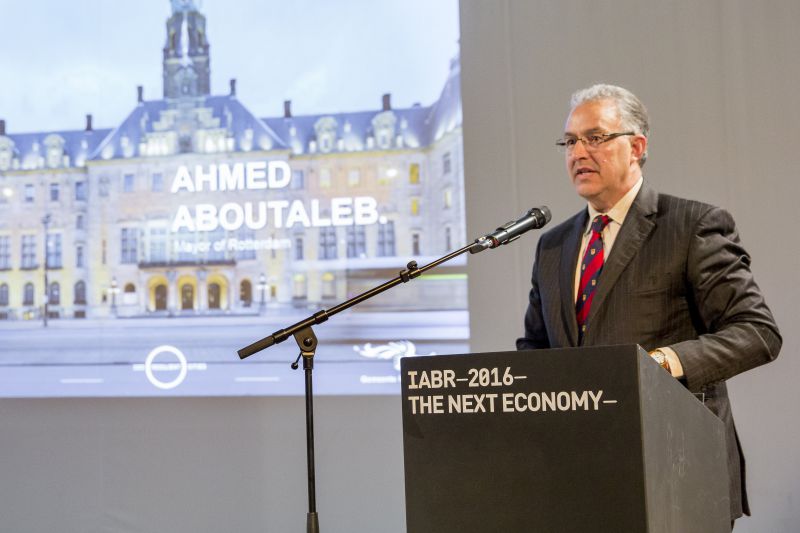On 7 and 8 June 2018, the IABR and Resilient Rotterdam will host the international conference Resilient Cities and the Energy Transition. Under the auspices of IABR–2018+2020–THE MISSING LINK, the city and the biennale bring together policymakers, urban developers, designers, entrepreneurs, experts, and others with experience in the field, from Rotterdam and the rest of the world, to exchange knowledge and together look for new possible solutions and their implementation. Towards a resilient future!

mayor Aboutaleb launches first resilience strategy Rotterdam (2016)
© Roel Dijkstra
7 June: Resilience Strategy Rotterdam
Day 1 of the conference centers on the city’s Resilience Strategy in its broadest sense. In May 2016, Rotterdam was the first Dutch city to launch a Resilience Strategy, on the platform of the IABR–2016. On 7 June we’ll focus on the issues governments, entrepreneurs, designers, engineers, and students face as they work towards the resilience of their cities.
7 June: Program
Mayor Ahmed Aboutaleb will open the event at 2 p.m. Subsequently, Arnoud Molenaar (Chief Resilience Officer) and Joachim Declerck (Lead Designer IABR–Atelier Rotterdam and member of the curator team IABR–2018+2020) will give lectures. Afterwards, visitors have the opportunity to join a breakout session of their choice. For more information and to register, please click here.
Joachim Declerck’s lecture will give a sneak preview of the interim results of the IABR–Atelier Rotterdam: The Energy Transition as an Inclusive Urban Project. The second day of the conference, Friday 8 June, is entirely dedicated to the most important question the Atelier raises: How can we use the energy transition as leverage to create more resilient cities?
8 June: The Energy Transition as Leverage for Resilient Cities
The translation of the objectives as agreed in Paris into efforts at the national and local level means the real work is now about to begin. The concrete activities that follow from this directly and firmly touch upon people’s daily lives. Local governments, civil society organizations, businesses and citizens are increasingly having their say;articles about the (fresh) questions that accompany every step we take appear in the media almost daily. Common denominator of those questions: How can we bring all activities, policies, and local initiatives in line with the collective objectives, and how can we do this in a way that leads to ecological and social profit? Because it is clear that people are not equally capable of anticipating the forthcoming measures, let alone of taking advantage of them as a matter of course. How can we create a level playing field? And how can we use the interventions related to the energy transition to develop a more inclusive form of urban development at the same time?
We will address these questions on the basis of the research carried out by the IABR–Atelier Rotterdam and try to take steps towards jointly defined possible solutions. Around the world, people have dedicated themselves to this quest for solutions, which vary from integrated strategies to local initiatives at the neighborhood level. But do all of these initiatives, insights, and experiments add up to the radical adaptation and behavioral change we need? What can practices from all over the world learn from each other? And how far along is Rotterdam?
8 June: Program
In the morning, a plenary program includes contributions by George Brugmans (President IABR), Emile Klep (Director of Urban Design for the City of Rotterdam), Floris Alkemade (Dutch Government Architect and member of the Curator Team IABR–2018+2020) and Joachim Declerck (Lead Designer of the IABR–Atelier Rotterdam and member of the curator team IABR–2018+2020). Short pitches by stakeholders who are actively involved in the energy transition will familiarize you with the Rotterdam playing field. A roundtable discussion will broaden the scope of the conversation and examine ways to make the energy transition a lever of socioeconomic development.
In the afternoon, breakout work sessions based on thematic perspectives will center on issues specifically addressed by the IABR–Atelier Rotterdam:
- The energy transition as a lever of the solidary city.
- The energy transition and the circular economy.
- The energy transition and the built environment.
Each session will be kickstarted by showing research by design done by IABR–Atelier Rotterdam, followed by a number of short pitches that broaden the range of perspectives and discussion topics. A moderator will subsequently lead the joint seach for possible solutions: Which seeds have the potential to grow into scalable and replicable solutions?
Chairman: Arie Lengkeek
Language: Dutch.
For more information about the program of June 8, and to register, please click here.